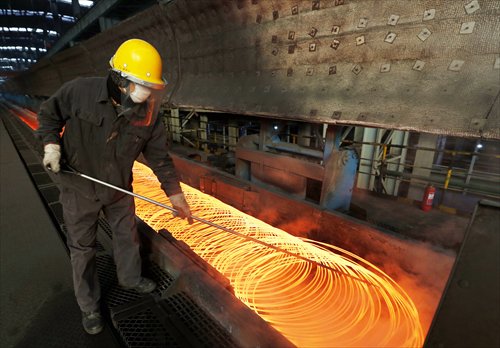Steel not being dumped in EU: MOFCOM
Provisional tariffs launched against domestic rebar

A worker at a steel factory in Lianyungang, East China's Jiangsu Province Photo: CFP
Chinese steel companies are not involved in dumping surplus goods in the EU and overcapacity in the domestic steel industry has been curbed after a string of measures, an official noted Wednesday.
The comment came after the EU set provisional tariffs on Chinese rebar steel of between 9.2 percent and 13 percent, the Financial Times reported on January 29.
Domestic steel companies have responded actively to an EU anti-dumping investigation into Chinese rebar steel launched in April 2015, and the low preliminary tariffs are not evidence of dumping by China, Shen Danyang, spokesperson for the Ministry of Commerce (MOFCOM), told a briefing in Beijing.
"Overcapacity is a worldwide industrial issue, and the Chinese government and enterprises have stepped up efforts to restructure the steel industry and cut excess capacity," Shen said.
"Pressure from market competition has also [helped reduce] capacity," he noted.
Resolution to cut capacity
During the 12th Five-Year-Plan period (2011-15), domestic steel production capacity was cut by 98 million tons and the country plans to cut crude steel production capacity by a further 100 to 150 million tons over the next five years, said Wang Guoqing, director of the Beijing-based Lange Steel Information Research Center.
The Chinese government has rolled out a series of measures to regulate the industry. For instance, policies have been launched to unify steel production standards and to improve technology in the industry in a bid to guarantee product quality, she said.
The moves show China's "resolution" to curb overcapacity in the sector, Wang noted.
However, experts noted that overseas markets such as the EU, the US and Latin America still have doubts about the low price of Chinese steel products, saying that the country is dumping steel products and calling for anti-dumping measures against Chinese steel imports.
On Monday, thousands of European steelmakers descended on Brussels, calling on officials to do more to restrict imports of cheap steel products from China.
Production and labor costs in China are still lower than in the global market, and this is why domestic steel products are cheaper, said Wu Wenzhang, general manager of consulting firm Steelhome.
Despite the low prices, China's steel industry is strongly competitive in the global market thanks to its high production efficiency and advanced equipment, Wu noted.
"It is unfair to blame China all the time," Wang said.
Joint efforts
Trade friction occurs frequently in the steel industry, MOFCOM said, noting that the EU has launched 15 anti-dumping probes into products imported from China since 2014, eight of which related to steel products, according to a statement released Sunday by MOFCOM.
The statement said that the EU has announced the launch of anti-dumping probes into Chinese seamless steel tubes, heavy and medium plates and hot-rolled flat steel, and has decided to conduct provisional anti-dumping measures against Chinese cold-rolled steel sheets.
The EU's anti-dumping measures toward Chinese steel products will not have a significant impact on the Chinese steel industry because the EU is not the largest market that China exports steel to, according to Wu.
China expects that the EU will comply with the WTO rules during the investigation process, MOFCOM said, noting that China also hopes to strengthen economic and trade cooperation with the EU and tackle the overcapacity issue together.
Both sides should provide more development opportunities for their steel industries, and protectionism will just exacerbate the overcapacity situation, Shen said.
Related: Jan investment into US from China rises
Chinese investment into the US reached about 10.22 billion yuan ($1.57 billion) in January 2016, 3.9 times more than that in the same period last year, data from MOFCOM showed Wednesday.
Merger and acquisition projects between the two countries worth more than $10 billion were signed during the period, MOFCOM said, noting that Chinese investment in the US will see rapid growth in 2016.
And US investment in the domestic Chinese market also saw growth in January, rising 463.6 percent year-on-year.